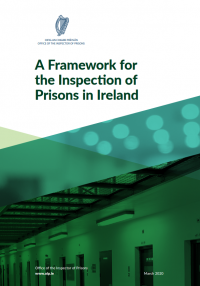A Framework for the Inspection of Prisons in Ireland
15th September 2020
The below is a brief summary of the Framework. See IPRT’s response to its publication here.
 A Framework for the Inspection of Prisons in Ireland outlines how the Office of the Inspector of Prisons will conduct inspections of prisons in Ireland. The Framework is informed by the statutory underpinning of the Inspector in legislation, national legislation relating to prisons, prisoners’ rights, and international obligations owing to prisoners. The Framework is also informed by relevant international human rights standards, particularly the preventative approach of the standards set by the Optional Protocol to the United Nations Convention Against Torture and Other Cruel, Inhuman or Degrading Treatment or Punishment (OPCAT). While Ireland is yet to ratify the OPCAT, the Programme for Government contains a commitment to ratify and implement the Protocol with 18 months of the formation of the Government. If this commitment is delivered on, this would result in OPCAT ratification by end 2021.
A Framework for the Inspection of Prisons in Ireland outlines how the Office of the Inspector of Prisons will conduct inspections of prisons in Ireland. The Framework is informed by the statutory underpinning of the Inspector in legislation, national legislation relating to prisons, prisoners’ rights, and international obligations owing to prisoners. The Framework is also informed by relevant international human rights standards, particularly the preventative approach of the standards set by the Optional Protocol to the United Nations Convention Against Torture and Other Cruel, Inhuman or Degrading Treatment or Punishment (OPCAT). While Ireland is yet to ratify the OPCAT, the Programme for Government contains a commitment to ratify and implement the Protocol with 18 months of the formation of the Government. If this commitment is delivered on, this would result in OPCAT ratification by end 2021.
The Framework follows a range of domestic legal requirements, including the Prison Rules 2007, but also draws heavily on international obligations and standards, including: The Universal Declaration of Human Rights (UDHR), The United Nations Convention Against Torture and other Cruel, Inhuman or Degrading Treatment or Punishment (UNCAT); and The European Convention for the Protection of Human Rights and Fundamental Freedoms (ECHR). Of particular importance to the work of the Inspectorate are three sets of authoritative standards deemed to be best practice: The European Prison Rules (2006), The United Nations Standard Minimum Rules for the Treatment of Prisoners (the Mandela Rules) (2015) and The United Nations Rules for the Treatment of Women Prisoners and Noncustodial Measures for Women Offenders (the Bangkok Rules) (2010).
The work of the Inspectorate is also influenced by academic bodies and advocacy groups in Ireland. IPRT’s “Progress in the Penal System” (PIPS) standards, which are grounded in human rights standards and progressive practice, are detailed in the Framework as one study which informs the work of the Inspectorate.
The Framework is based on five ‘Focus Areas’, which are the major factors which affect, and reflect, the welfare and human rights of prisoners and others working in and visiting prisons. The Focus areas are: Safety and Security; Respect and Dignity; Health and Wellbeing; Rehabilitation and Development; and Resettlement.
From 2020, provided the availability of adequate resources, prisons across Ireland will be subject to a full inspection at a minimum of every 5 years, with the hopes of inspection every 2-3 years. Follow-up and/or Functional/Thematic Inspections are to be carried out in the intervening period. However, it Is specifically noted in the Framework that the aim for prisons holding remand prisoners is for more regular inspections, at least once every two years.
The Inspectorate will maintain four types of inspection: General Inspection, Thematic Inspection, Functional Inspection, and Follow-Up Inspection. General, Thematic and Functional Inspections will follow a common core format comprising of Preparation, Engagement, Reporting and Monitoring. The “Preparation” phase will range from 8-12 weeks, where the Inspectorate will become mobilised, provide data packs, assign teams and develop a plan. The “Engagement” phase will range from a much smaller 1-2 weeks, comprising of visits, prisoner and staff surveys, observations and assessments, interviews and discussions, documentation reviews etc. The Reporting phase will last approximately 12 weeks, encompassing reports, validation and submitting to the Minister for publication. Lastly, the Monitoring phase is an ongoing period that comprises of self-assessments and follow-ups.
Typically, Follow-up Inspections are expected to take place on an announced basis. The IPS will be made aware in advance that a Follow-up Inspection will be happening and what it is likely to contain. The intent of the Follow-up Inspection is not to repeat the General Inspection, but to focus on assessing the progress made, particularly against the recommendations following the General Inspection.
The Framework is to be maintained as a “living” document, with its contents frequently updated in light of any developments, including amendments to the Prison Rules and emerging international good practice. The Framework is expected to be formally reviewed as required, with a maximum review period of three years.
The Framework also recognises that issues may of course arise within prisons when no inspection is taking place or is imminent within that institution. The Framework states that “The IPS should consider developing and implementing a policy of self-assessment on a quarterly basis across all of its establishments, with responsibility for completion of the self-assessments sitting with the Governor in each prison establishment.”
A Framework for the Inspection of Prisons in Ireland is available in full here.




